Though the area was depopulated of Muslims by the genocide, many survivors and their children have come back.
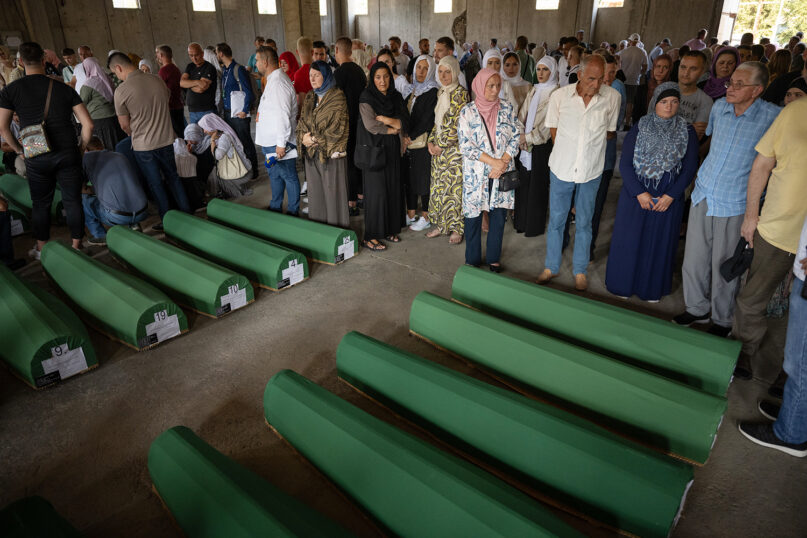
Attendees gather around the rows of coffins returned to the memorial center in Bosnia in early July. Photo by Shahar Azran/WJC
July 13, 2023
By David I. Klein
SREBRENICA, Bosnia-Herzegovina (RNS) — Nearly three decades later, Srebrenica’s dead are still coming home. Earlier this month, the remains of 27 men and three teenage boys were delivered to the remote valley that played host to Europe’s second genocide of the 20th century.
The victims, identified by the International Commission on Missing Persons, will be buried alongside the more than 6,600 graves that dot the Potočari valley in eastern Bosnia and Herzegovina, now home to the Srebrenica Memorial Center honoring the 8,372 Bosniak Muslims, mostly men and boys, murdered at the hands of Serb militias in 1995 amid the Bosnian war.
The Srebrenica massacre, carried out in an area the United Nations had declared a safe zone for refugees, has since been deemed an act of genocide by successive courts within the U.N.’s International Criminal Tribunal for the Former Yugoslavia, or ICTY.
The funeral honoring the 30 massacre victims, conducted by Bosnia’s highest-ranking Islamic leader, the Reisul-Ulema or grand mufti, Husein Kavazović, was part of a number of events commemorating the 28th anniversary of the genocide, including a march that drew thousands and, on Monday, a conference dedicated to both Srebrenica and Holocaust remembrance that was hosted jointly with the World Jewish Congress.
The conference was the project of Menachem Rosensaft, the WJC’s associate executive vice president and the son of two Holocaust survivors. Rosensaft has spent most of his life working in the field of Holocaust remembrance but in recent years has become an impassioned advocate for awareness of the Srebrenica genocide.
“We commemorate the victims of the Holocaust, because they’re our families, our communities, our people, but also because they were the victims of a genocide, they were the victim of a horrendous crime against humanity,” he told Religion News Service. “And we have to, in equal force, acknowledge and commemorate the tragedies perpetrated against others. Never again does not mean never again just to Jews, it means never again to anyone. We will not stand by when anyone is victimized, when anyone is oppressed. That has to be the basic basis of remembrance. It is what motivates the World Jewish Congress to be here and it is certainly what motivates me.”
On Tuesday, ahead of the funeral, Rosensaft gave a speech at the commemoration event. “If we forget them, our souls will turn to stone, our eyes will never again shed tears,” he said of the genocide’s victims.
“Our Bosniak nation is a nation that carries pain and sorrow,” Kavazović said in a statement to the wider Islamic community before the funeral. “I ask God to grant the families of the victims every good thing, that their children be strong, that they be a message to all those who did this, but also to those who may harbor the same in their souls for some future time.”
The dead of Srebrenica are not the only ones returning. Though the area was depopulated of Muslims by the genocide, many survivors and their children have come back.
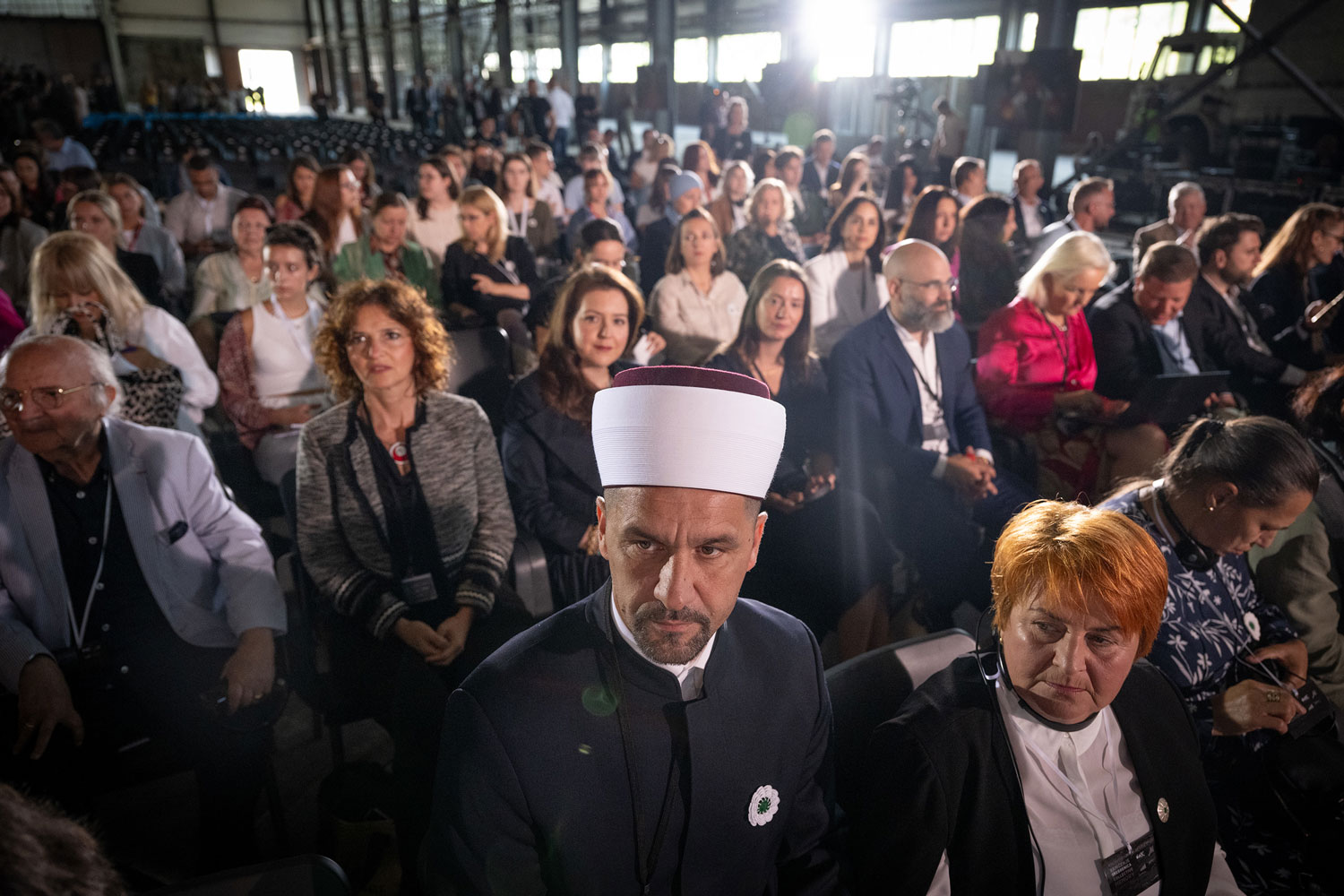
Attendees join together for a presentation during the Srebrenica Genocide Commemoration in early July in Bosnia. Photo by Shahar Azran/WJC
Today, Srebrenica’s population is about half Muslim and half Orthodox Serb. The 23 mosques of Srebrenica destroyed in the war have all been rebuilt thanks to donations from around the world.
Damir Pestalic, the chief Imam of Srebrenica, stressed that though once empty, the community now has multiple full Islamic schools. Speaking alongside leaders from the World Jewish Congress on Monday (July 10), he recalled suggesting to his daughter that they move to California. He said she dismissed the idea, telling him she would “take one tree in Srebrenica over all of California or America.”
“We want the children who are born here to stay in Srebrenica,” Vahid Fazlović, the mufti of Tuzla, said during a commemoration event in Potočari on Tuesday. “The Islamic community will not falter in its relationship with Srebrenica, and in addition, it will constantly encourage all other institutions, all factors in our society, the state, to fulfill their obligations toward Srebrenica.
“It is up to us to pass on the awareness of this place to the generations that are growing up,” he added. “We have rejuvenated families here. Perhaps few expected that we would have new and good sprouts in Srebrenica. Thank God that is so. This is due to the people who returned here, with so much courage and daring, even after the crime.”
The return of Bosniak Muslims to Srebrenica has not been without conflict, though.
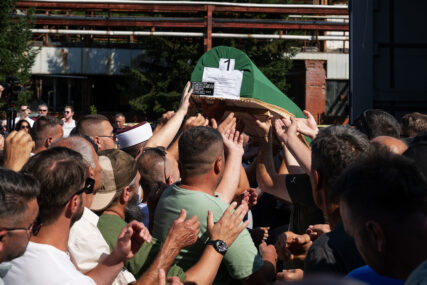
The crowd of attendees at the Srebrenica Genocide Commemoration lift the first coffin of remains overhead outside the memorial center in early July in Bosnia. Photo by Shahar Azran/WJC
This year’s commemoration comes at a time when tensions between Bosnia’s three constituent ethnic groups — Muslim Bosniaks, Catholic Croats and Orthodox Serbs — are running higher than they’ve been in decades.
Milorad Dodik, the Serb member of Bosnia’s tripartate presidency, and the leader of Republika Srpska, the Serb majority enclave within Bosnia — where Srebrenica is located — has spoken openly of secession and continues to deny that Serb forces committed a genocide in Srebrenica in 1995. In March, Bosnia’s prosecutor office opened a case against Dodik for genocide denial, after remarks he made in Republika Srpska’s capital, Banja Luka, in February.
On Tuesday evening, after most mourners had left the area, a Serb church in the town of Srebrenica itself held a concert with nationalist songs, according to Bosnian Media.
Pestalic called on the church to explain the event.
“I want to invite the Serbian Orthodox Church to tell us what it was. The witnesses heard the announcement of the program, it was terrible. The announcement that they are celebrating the liberation day of Srebrenica tonight and that they want to liberate what little is left,” Pestalic said. “Let them answer what that means. All authorities should get involved. This is not a harmless situation. This is not only about humiliating the victims, but also about threats of new crimes.”
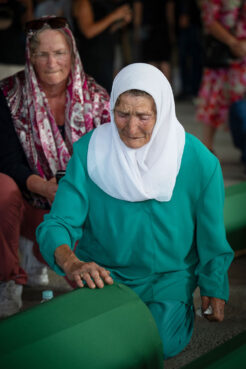
A woman kneels to touch one of the coffins during the Srebrenica Genocide Commemoration. The remains of many individuals were returned to the memorial center and included in part of the commemoration event in early July. Shahar Azran / WJC
Munira Subašić, the president of the Mothers of Srebrenica organization, which has fought for acknowledgment of the massacre as a genocide, spoke to those gathered at Monday’s conference about the ongoing difficulty to make the massacre part of the local school curriculum.
Subašić, who has lived in Srebrenica since the early 1960s, lost 22 close family members in the genocide, including her husband and son.
Currently, in state schools in Republika Srpska, even in areas around Srebrenica where a Bosniak Muslim majority has returned, said Subašić, the genocide is not taught about.
“When you go to a school in Srebrenica, it is as if you entered a church. It is important for them to have St. Sava there and Ratko Mladić, their national hero,” she said.
St. Sava, a 12th-century Serbian prince, monk and intellectual, is considered the patron saint of Serbs and education in the Serbian Orthodox Church, while Mladić was commander of the Army of Republika Srpska during the Bosnian war and is currently serving a life sentence in The Hague, Netherlands, after being convicted of genocide, four counts of war crimes and five counts of crimes against humanity by the ICTY.
During the war, Srebrenica was a Bosniak majority enclave within the Serb majority Republika Srpska. For the Serb militias who rejected the idea of being part of an independent Bosnian state, and instead desired to pursue independence or join with Serbia, Srebrenica was a complication. The Muslim majority region would have cut Republika Srpska in half.
In 1993, the United Nations declared the area, which had swelled to nearly 50,000 Bosniak Muslim refugees, a “safe zone” and called for both Bosniak and Serb forces in town to be demilitarized. But in June 1995, Serb forces under the command of Mladić assaulted the region and conquered the town. Within 10 days, the Serb forces had murdered more than 8,000 Bosniak Muslims, tossing them into mass graves along the river Drina.
Three days before the anniversary, more than 3,000 Bosniaks from around the country began a 100-kilometer march to the site, known as the Marš Mira or March of Peace, to pay their respects to the dead.
The march, which has been held each year since 2005, traces the reverse of the path a column of Bosniak men attempted to make to escape to safety during the slaughter. Most did not survive.
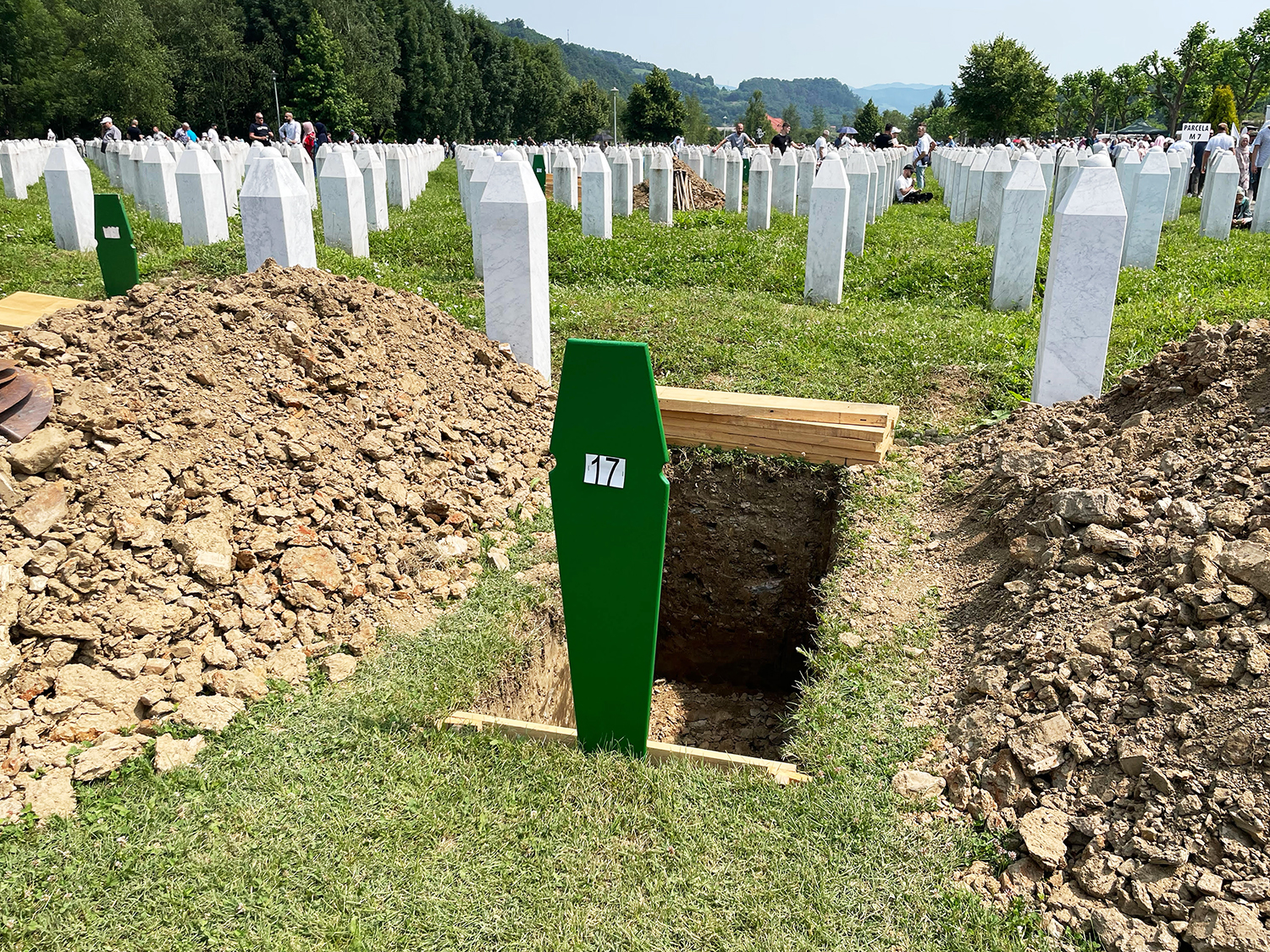
A gravesite waits empty and marked with a number during the Srebrenica Genocide Commemoration in early July. A number of remains were returned to the site as part of the commemoration ceremony. Photo by David Ian Klein
“Thousands were killed here They are gone. Their houses are gone. But today thousands of people are coming back to feel as one with them,” Asra, a Muslim woman who grew up in the nearby city of Tuzla but today lives in the Netherlands, told RNS about why she continues to visit for the anniversary events. She, like others interviewed at the gathering, offered only her first name.
For Adis, a Bosnian man from a town between Tuzla and Sarajevo, it was important for him as a Bosnian to understand the place where his country’s greatest tragedy occurred.
“I came to remember and get a feeling of what it must have been like then,”Adis told RNS. “When you are here, you can understand a little of what it was like when thousands were packed into this small place.”
Cihan, a Turkish man who came from the city of Batman in Eastern Turkey, told RNS he was inspired to come by the words of Bosnia-Herzegovina’s first president, Alija Izetbegovic, who said, “If we forget the genocide done to us, we are compelled to live it again.”
“If we forget that genocide, that genocide can be again,” Cihan said. “We have seen too many genocides, unfortunately. That is why I am here.”
No comments:
Post a Comment